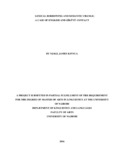| dc.description.abstract | In this research, an attempt is made to investigate lexical borrowing from English into Gĩkũyũ and the cases of semantic change. More specifically, the research aims to determine the mechanisms involved in borrowing English words into Gĩkũyũ; to explore whether the borrowed words retain their original source language meaning or they undergo semantic shift; and finally to investigate whether there exist socio-cultural and/ or psychological factors that influence borrowing and semantic change. This study hypothesized that Gĩkũyũ has extensively borrowed from English. It further hypothesized that the borrowed lexical items undergo semantic change. Another hypothesis is that there exist social and psychological factors responsible for borrowing and semantic change. The data for this research is based on an inventory of commonly used Gĩkũyũ words borrowed from English. They are drawn from across various semantic domains. These include ecology, material culture, social culture and social organization among others. Much of this qualitative analytical study was done through observation and interaction with native speakers of Gĩkũyũ in everyday conversations as well as in the media such as vernacular radio and TV stations. Public fora such as church sermons and public meetings were also used. Introspection or intuition and elicitation were also used when the need arose. The cognitive approach to Lexical Semantics was the theoretical framework used for this research. The study first explores the mechanisms used in the borrowing process. It then compares the source language (SL) meanings of the borrowed words with the meaning in the recipient language to determine if semantic change has occurred. Afterwards it investigates on the social and psychological factors responsible for what was observed. From this study, it emerged that Gĩkũyũ speakers have borrowed and nativised a significant number of words from English. This is the case with direct loans. Other mechanisms such as loan translations, loan shifts, loan creations, clippings and coinage were also used in the process of borrowing. Most of the borrowed words were noted to have retained the SL meaning, though there were also cases of semantic change noted. The processes involved in the case of semantic change include broadening, narrowing, meaning shift and metaphorical semantic change. There were also cases noted where there was no semantic change (zero semantic change). It was also noted that there are certain social and psychological factors that influenced borrowing and semantic change. These are prestige and attitude as well as other factors such as the kind of interaction the Gĩkũyũ speakers had with the British during the colonial period. Chapter one gives the background information to the study which includes the history of the Gĩkũyũ people and their interaction with the British. The various methods and mechanisms used during the borrowing process are discussed in chapter two while chapter three describes cases of semantic shifts. Chapter four discusses the various social and psychological factors that influence borrowing and semantic change. The research conclusion is given in chapter five. | en_US |



